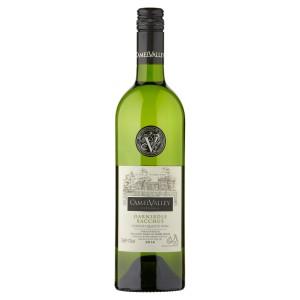England and Wales have both had a set of PGI- and PDO-designated regulations for certain wines (both still and sparkling) since 2007. These regulations are approved for a range of grapes (including Chardonnay, Bacchus, Pinot Noir, Pinot Meunier, Pinot Blanc, Pinot Gris, and about 60 other grapes) and encompass the entirety of the countries’ geographical areas—save for those spots with an elevation higher than 220 meters (722 feet) above sea level.
However, since early 2017 England has also had a PDO for one very specific wine—Darnibole Bacchus—grown in one very specific 5-hectare (12.4-acre) plot and produced at one very specific winery. To date, Darnibole is the only single-vineyard wine in the UK to be awarded PDO status. Sounds interesting!
For starters, Darnibole PDO wine may only be produced at the Camel Valley Winery, located in Cornwall County in south east England. Darnibole PDO is a dry white wine made from 100% Bacchus grapes.
The regulations for Darnibole PDO are quite specific, and include the following:
- Must be produced from 100% Bacchus grapes, grown in the specified region
- Must be hand-harvested, and crushing must begin within 2 hours of the completion of the harvest
- May not be acidified, de-acidified, chaptalized, or sweetened
- Must be cold-pressed with minimal pressure and cold-fermented to dryness
- May be racked and fined, but no animal products may be used at any point in the production process
- Must be bottled under screw cap
The PDO application and document declare that the Bacchus wine produced in Darnibole is sufficiently different from the other Bacchus-based wines produced in England to warrant its own PDO, and may be described as follows: “Fresh with an expression of minerality providing for apple or gooseberry notes beginning at the front and persisting throughout. Occasionally, notes of kumquat and white peach appear and grassy notes at the end. Less obviously fruit-driven and more mineral than other Bacchus.”
The Darnibole PDO is of particular interest at this point in time, as it remains to be seen how the United Kingdom-based geographical indications (which include Scotch Whiskey, Irish Whiskey, and Stilton Cheese in addition to other products) will be handled after the UK exits the EU (if this does indeed come to pass). The subject was discussed a few weeks ago on the Drinks Business website.
References/for more information:
- https://www.camelvalley.com/
- https://www.camelvalley.com/news/camel-valley-makes-history/
- PDO – Darnibole Wine (includes a map)
Post authored by Jane A. Nickles – SWE’s Director of Education and Certification – jnickles@societyofwineeducators.org

